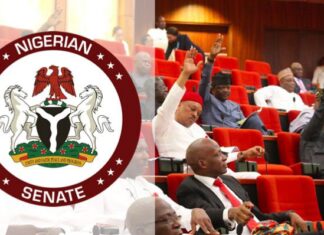Politics and a laissez-faire national attitude, conditioned by easy oil money, conspire to put the exploration of bitumen deposits in the back burner, despite the huge potential to create thousands of jobs and beef up the federal treasury.
Economic value
Mines and Steel Development Minister, Musa Sada.
Wikipedia defines bitumen, also known as asphalt, as a sticky, black and highly viscous liquid or semi-solid form of petroleum. It may be found in natural deposits or may be a refined product.
It is classed as a pitch and used mostly in road construction as glue or binder mixed with particles to create asphalt concrete.
Bitumen is also used for waterproofing products, including production of roofing felt and for sealing flat roofs.
It can be modified by mixing it with fresh water and a small amount of phenol-based surfactant to produce conventional fuel oil.
Bitumen-based fuel is currently used as a commercial boiler fuel in power plants in Canada, Japan, Lithuania and China.
The terms asphalt and bitumen are often used interchangeably to mean both natural and manufactured forms of the substance.
Bitumen coastal belts
Bitumen was first discovered in Nigeria by German scientists in 1900 and exploration began in 1905.
But the government has failed over the years to fully explore what today has accumulated to deposits estimated at 42.74 billion tonnes, the second largest in the world.
The mineral lies over 120 square kilometres beneath the earth in the costal belts of Lagos, Ogun, Ondo and Edo States. The largest chunk is in Agbabu, Ondo State.
Conoco has performed a technical and economic evaluation of these deposits, and believes there could be over 13 billion barrels of oil in these tar sands and bitumen, according to Wikipedia.
Efforts in the Babangida, Obasanjo years
Two factors bandied about as disincentives to bitumen exploration and exploitation are a lack of technical expertise and high cost of tapping the resource.
But it is obvious that Abuja is not serious about it as easy money made from crude oil hinders even the feeble effort to exploit bitumen.
Bitumen is not the only economic potential so neglected. Nigeria is endowed with other numerous mineral resources such as cassiterite, columbite and tantalite, lead, gold, barite, gypsum, coal, iron ore, and uranium.
Former military President, Ibrahim Babangida, showed the first serious commitment to bitumen exploration when, after a visit to Agbabu, he established the Bitumen Project Implementation Committee (BPIC) in 1989.
BPIC was mandated, among other functions, to create a structure for the full exploitation of solid minerals in the country.
Former President Olusegun Obasanjo attempted to take the initiative to another level in 2002 when two companies – Nissands Nigeria and Beecon Nigeria, out of 34 firms – won the bid to explore bitumen across the 120 square kilometres in the four states.
But the project has since been abandoned.
The question is, why is the government, at federal and state levels, not interested in diversifying the economy?
Bitumen deposits twice oil reserves
Bitumen deposits in Nigeria are twice oil reserves. If fully developed, it will meet local demand for road construction and also earn foreign exchange. It will also generate employment.
Fifteen indigenous companies were recommended for the slots in the blocs marked by the federal government for pilot mining before the project was abandoned.
A man in Akure, who was engaged in the project, who did not want to be named, recalled that the companies were recommended after they satisfied the financial, environmental and technical requirements.
He lamented that “it is rather unfortunate that so much money invested by the federal and state governments has gone down the drain.”
According to him, the government has no interest in bitumen and pays lip service to its exploration to score political points and garner votes from the communities where the mineral is deposited.
The bitumen project office in Akure and Odigbo in Ondo State is overgrown with weeds and the equipment there have rusted.
Mimiko raises hope of exploration
However, Governor Olusegun Mimiko recently raised the hope that the exploration of bitumen will soon begin as the Ondo State government has been given approval for a bloc.
He said Ondo is working with Abuja and technical partners to commence exploration, and the state has applied to revalidate its certificate of exploration.
Mimiko also disclosed that the state has established relationship with Trinidad and Tobago and other countries to carry out the project, which he hopes will provide jobs, raise living standards and boost the national purse.











